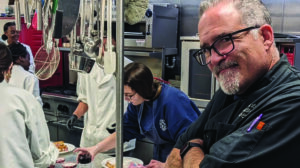Matt Dunston lives on a cul-de-sac in Bent Tree III, a subdivision near Monument, in unincorporated El Paso County. The 10 homes on Scarsbrook Court are valued at about $750,000 each, Dunston said. However, the gravel road at the end of all the driveways deterred from the property values, and the homeowners were tired of ruts and tracking mud, snow and slush into their high-end homes.Dunston called the El Paso County Department of Transportation, and asked officials when the road would be paved. The answer was close to never, so Dunston and his neighbors took matters in their own hands and purchased a paved road.Two weeks ago, Scarsbrook Court was transformed from a dirt road into a paved road under the department’s fairly new and somewhat clandestine program, the Resident Participation Program. In 1999, the commissioners approved the program, which allows rural residents, who want to convert dirt and gravel roads to asphalt, to finance the project out of their own pockets.The residents pay the county to pave the road, and the county throws in the prep work at no cost.Dunston thinks it’s a good deal, but he said the biggest challenge was convincing all his neighbors. The program has two criteria: All the people living on the road must agree to the paving and all must present a check to the county before the project is assessed for approval.”If there are 10 people living on the street, the county needs 100 percent participation,” said Jim White, the customer service superintendent for the transportation department. “The road must tie in with another paved road because we don’t want a ribbon of asphalt coming out of nowhere.”And White doesn’t care where the money comes from. “I don’t care who pays for it,” he said. “Someone on the block may not be able to afford the cost of paving the road, so the next door neighbor might kick in his share.”There are 12 properties on Scarsbrook Court – 10 homes and two vacant lots. All the owners, except one, agreed to pay for paving the half-mile road at a cost of about $27,000. The homeowner who did not support the plan was moving, Dunston said. There also was a lot owner who refused to pay, Dunston said. The lot owner even refused Dunston’s offer to buy the lot. Property owners shelled out $2,250 each. Dunston and five others contributed an extra $900 each to make up the difference.Dunston said the county hired Rocky Mountain Materials to do the work and the project costs would have been higher if the residents had hired their own contractor. “The prep work is a big part of the project, and the county does that at no charge,” he said. “Besides, the county still owns the road.”Dunston knows what it takes to build roads. He is a contractor and developer and has owned Custom Castles for 15 years. Dunston has built a few roads for his developments, which the county now requires. The requirement didn’t exist when Dunston’s house was built. “And why shouldn’t we have to pay for them?” he asked. “It makes good sense because it increases the property’s value.”Dunston said that some of his neighbors questioned the expense thinking the county would eventually pave their road. But that eventually might be a long way off.”Each season, we get a certain amount of money to pave roads, and we only pave the existing surface roads,” White said.When White intercepts a call from someone who wants a road paved, he sends a package of information outlining the program and its regulations. He said most people are glad there is an option, including eight who live on Happy Landing Drive., which the county paved three weeks ago.The neighbors pitched in $31,659 for a road makeover. Residents who live on Kakatosi Lane in Black Forest financed a new surface for their road, which will be completed in September, White said.Many residents are satisfied with their gravel roads, but rely on the county to fix potholes, ditch problems and other minor road interruptions. White has received hundreds of those calls this summer because of heavy rainfall. In July 2004, White received more than 450 service requests, and he said the county “is about at that same stage for August.” In July and August 2003, the county received 319 and 336 calls respectively.Dunston and his neighbors no longer have to worry about potholes, mud and flying gravel – they have a paved road that the county will maintain. Although Dunston thinks the participation program is a good idea, he said it is probably limited to higher density and high-end areas because of the costs.However, if anyone is thinking about applying for the program, the person who rallies the neighbors walks a fine line between securing support and getting the money, Dunston said. “It took some public relations skills to convince the neighbors, but it was a fun way to get to know everyone.”(For subscription informaton to the Colorado Springs Business Journal, call 634-3223.)
Many residents don’t care about paved roads and are satisfied with their gravel roads, but rely on the county to fix potholes, ditch problems and other minor road interruptions. The county has received hundreds of those calls this summer because of heavy rainfall.






